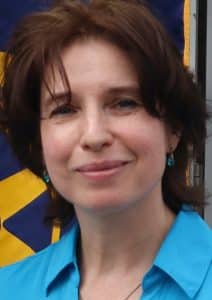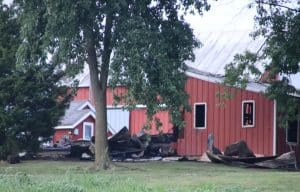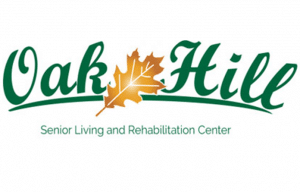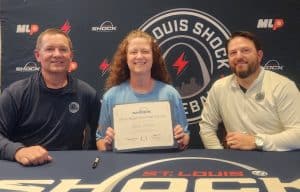Local woman torn by war

Just over a year after Russia’s invasion of Ukraine, many in the U.S. continue to seek greater understanding of the country that faces a daily onslaught.
Locally, the Columbia Rotary Club recently sought perspective from Natalya Pruitt, a German teacher at Waterloo High School who is of Russian and Ukrainian heritage and has lived in Columbia since 2009.
Pruitt spoke at the Rotary’s March 1 meeting, sharing her thoughts on the invasion while also providing a great deal of context on the history of Ukraine.
Personally, Pruitt said her mother is from Ukraine, but she was born in Sokhumi, a city along the Black Sea on the coast of Georgia, southeast of Ukraine.
For her, a major issue with discussions on the invasion has been the lack of attention on the eastern parts of Ukraine which have already been dealing with Russian aggression for years.
”A lot of attention has been focused on the West Ukraine or on Ukraine proper but not so much on East Ukraine, which is separatist held,” Pruitt said. “There the events have been happening since 2014, since the annexation of Crimea.”
To some extent, the divide between eastern and western Ukraine can also be seen in which country citizens support in the war.
Pruitt said many individuals within Ukraine are passionately in support of Russia. They insist that Ukraine is not its own distinct nation and is really just part of Russia.
Pruitt spoke at length about the history of Ukraine and the surrounding region, which has dealt with shifting borders and changing demographics for centuries up to now.
Ukraine, she said, really began to claim its name in the 18th century. Long before that, in the 13th century, the grand duke of Kiev – modern Kyiv – left for Moscow. The monarch’s departure, as Pruitt said, contributed greatly to the development and split between the Russian and Ukrainian language.
Ukraine changed hands a number of times in the centuries that followed, with influences by its modern neighbors of Lithuania, Belarus and Poland.
Pruitt said the influences from Germany, Poland and Lithuania contributed greatly to the east/west divide, as the east had far more influence from Russia.
She added Ukraine began to develop more of an identity between the 17th and 18th centuries, with a strong development of the Ukrainian language in the middle of the 19th century.
While the language began to flourish in this time, there was also a great deal of oppression from Czarist Russia, which banned the Ukrainian language, particularly in schools.
Eventually, Pruitt said, Ukraine attempted to declare its independence along with numerous other Russian provinces and governorships, but Russia soon quashed that attempt at a national identity.
Ukraine eventually established itself in 1991, Pruitt said, with a very pro-West president early on and more pro-Russian leaders following.
Around 2014, revolution broke out against the pro-Russian president who fled to Moscow. That vacancy was filled by an independent president, which prompted retaliation from Russia, leading to the ongoing conflict.
While Pruitt said a major aspect of the war is economics – Ukraine produces a great deal of nuclear power – a key part for her is the attempt to destroy Ukraine’s identity.
Pruitt was especially passionate about the Ukrainian language. She emphasized its uniqueness from Russian – noting that scholars compare the two languages in a similar way to Spanish and Italian.
“The problem is that no matter what Mr. (Vladimir) Putin says, Ukraine is a separate entity and it does have a separate language,” Pruitt said.
Many in Ukraine still side with the Russian ideal that Ukraine is not separate.
“They are trying to stamp out the notion that those people are Ukrainian, that they have identity,” Pruitt said. “They’ve been told that they are Russian. And I really, I don’t know how to change the mentality of some of my friends and former friends and some of my family members who keep saying that Ukrainians are traitors.”
She added a number of anti-Western theories have arisen, such as the idea those against Russia are colluding with the U.S. and the West to develop what she called “genetic experiments.”
Navigating this political divide among her friends and family in Ukraine, Pruitt said, has been challenging for her.
Pruitt said it’s also been difficult to hear what her family has dealt with as far as fleeing the violence and seeking safety.
She said she has kept in touch with a number of relatives as fluctuating power and communications allow, but she specifically spoke about an older aunt who lived in Irpin but has since been forced to move from place to place, ultimately ending up in a refugee camp.
“‘Since then, we’ve been traveling from place to place,’” Pruitt said, quoting her aunt. “‘This is the 11th bed that I’m sleeping in. At my age, it’s really hard. All I want to do, I just want this war to be over, and I want to go home.’”
Beyond her own relations, Pruitt also spoke to the devastating impact the war has had on Ukraine as a whole.
She spoke about how many have sought shelter in subways or have to deal with weekly water shipments, as the water out of their faucets is dirty. She also shared a more chilling anecdote about some of her family encountering an intact missile shell as they returned to their wrecked home.
Again she emphasized the identity aspect of the war as many Ukrainians are being brought into Russia.
“If it were not for the U.S., we wouldn’t have been on the map anymore,” Pruitt said. “We are talking about genocide. We are talking about a lot of, thousands and thousands of Ukrainians – children especially – citizens being evacuated.”
Regarding how the U.S. is handling the situation, she said it’s important for the country to be united when it comes to offering assistance for Ukraine.
“I don’t know if it’s gonna be military help – which is actually needed right now – or humanitarian help or financial help or anything else, I just want my friends and people around me to know that the money is not just going to waste,” Pruitt said. “It’s giving hope. It’s giving the sense of support and protection to a lot of people in Ukraine.”
Closer to home, Pruitt said she is currently seeking assistance in getting a large amount of medical supplies to Ukraine.
As she has been unable to work with the Ukrainian embassy locations in Chicago and Washington, D.C., she has thought about personally transporting whatever she can of the roughly 270 pounds of medical supplies, but would appreciate assistance in the logistics or other aspects of the donation.
Those looking to assist with the donation can contact Pruitt’s partner at mammoth@htc.net.






